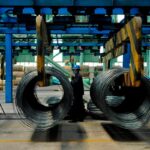I just spent three days along the St. Lawrence River, where the economic ripples of Washington’s latest trade stance are already transforming industrial communities. The aluminum giant Alcoa has suspended its planned $375 million expansion of Canadian operations – a move that would have created hundreds of jobs in Quebec’s Saguenay region.
“We’ve been waiting for this investment for years,” Marie Deschamps told me outside the Baie-Comeau smelter, where she’s worked for 17 years. “Now everything is on pause, and nobody knows for how long.”
The culprit? The Trump administration’s sweeping 25% tariff on Canadian aluminum, which has upended the economic calculus for North American metal producers and threatens to unravel decades of integrated supply chains.
Alcoa CEO William Oplinger didn’t mince words during yesterday’s quarterly earnings call. “The tariffs create significant uncertainty for our Canadian growth strategy,” he explained. “We’re forced to pause and reassess our capital expenditure plans until we have clarity on long-term trade policy.”
This pause affects three major projects at Alcoa’s Quebec facilities that would have modernized production lines and increased output by nearly 15% over the next five years. The company had promoted these investments as part of its sustainability strategy, as Quebec’s hydroelectric power makes its Canadian operations among the cleanest aluminum producers globally.
Trade data from the U.S. Commerce Department shows American manufacturers import roughly $9.5 billion in Canadian aluminum annually, representing about 50% of U.S. consumption. The material flows into everything from beer cans to fighter jets.
Walking through Baie-Comeau’s main street, the anxiety is palpable. Local business owners understand their fortunes are tied to the smelter’s prosperity. “When Alcoa sneezes, we catch pneumonia,” said Jean-Pierre Tremblay, who owns a hardware store that serves plant workers.
The tariff situation highlights the fragility of North America’s industrial integration. Under the USMCA trade agreement signed in 2020, Canadian aluminum was supposed to flow freely across the border. The treaty includes provisions specifically designed to strengthen regional supply chains against Chinese competition.
“This is the exact opposite of what the agreement intended,” explained Catherine Porter, trade analyst at the Peterson Institute for International Economics. “Instead of strengthening North American industrial capacity, these tariffs fragment it.”
The aluminum industry represents a critical national security interest. Defense contractors require high-grade aluminum for aircraft, naval vessels, and various weapons systems. Industry experts note that disrupting Canadian supply could actually increase dependence on less reliable sources.
The Canadian government hasn’t announced retaliatory measures yet, but past trade disputes suggest targeted countermeasures are likely. During the 2018 tariff dispute, Canada imposed dollar-for-dollar duties on American products ranging from bourbon to playing cards, strategically targeting politically sensitive regions.
For communities like Baie-Comeau and Saguenay, the economic uncertainty extends beyond the plant gates. Local officials estimate each smelter job supports three additional positions in the regional economy.
“We’re talking about generational employment here,” Mayor François Bouchard told me over coffee at a local diner where retired aluminum workers gather each morning. “These aren’t just jobs – they’re the foundation of our community’s identity.”
The International Monetary Fund warned last week that escalating aluminum tariffs could reduce North American GDP growth by 0.3% if they trigger a broader trade conflict. The organization’s chief economist called the current approach “counterproductive to shared economic security.”
Alcoa’s stock dropped 4.7% following the announcement, with analysts at Goldman Sachs downgrading their outlook for the company. Industry observers note that while U.S. producers might temporarily benefit from reduced Canadian competition, the long-term effects could undermine American manufacturing that relies on affordable aluminum.
Back at the Baie-Comeau plant, workers are finishing their shifts with more questions than answers. Philippe Gagnon, a third-generation aluminum worker, summarized the sentiment: “Politicians play these games, but we’re the ones living with the consequences. My father and grandfather built their lives around this plant. I was hoping my son could do the same.”
As Washington and Ottawa navigate this latest trade dispute, communities along the St. Lawrence wait in limbo – their economic futures held hostage to geopolitical calculations happening hundreds of miles away.






